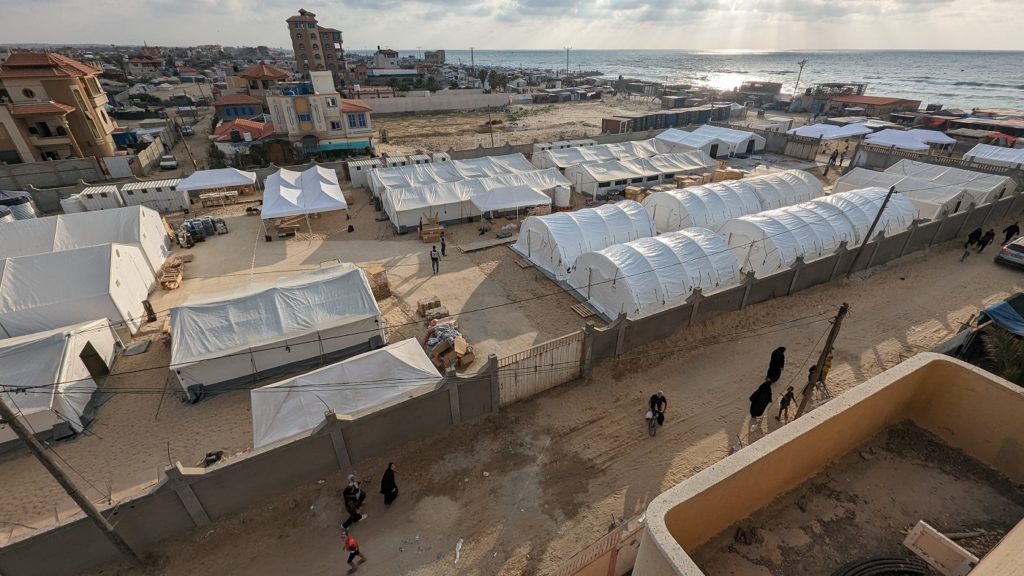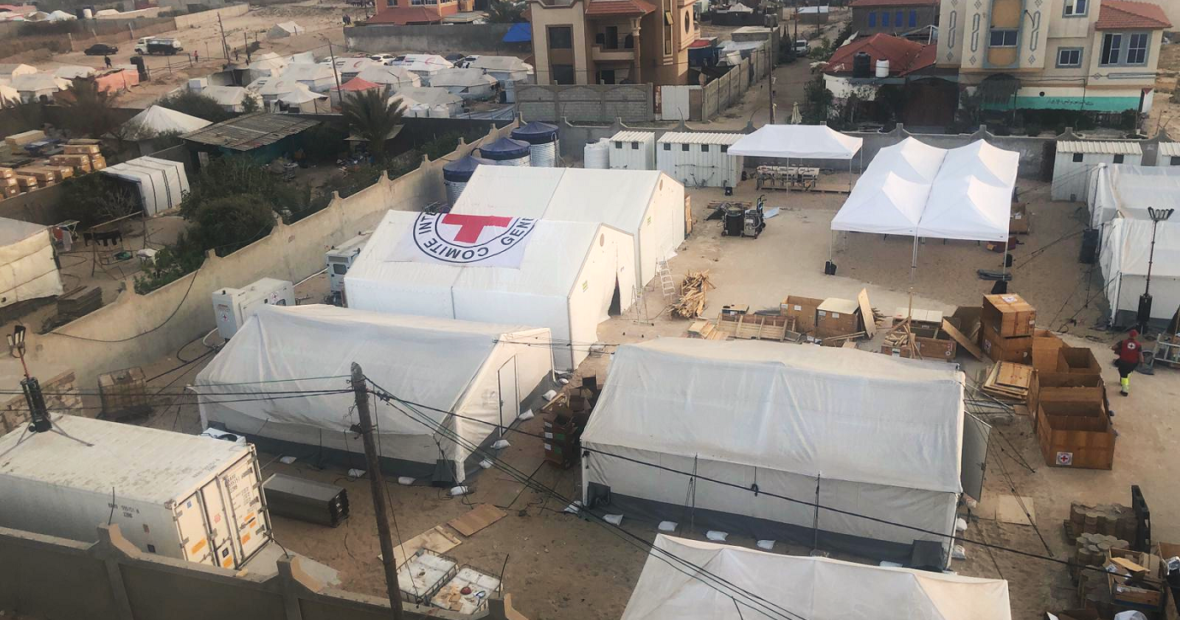Geneva – The International Committee of the Red Cross (ICRC) and eleven Red Cross National Societies are combining efforts to open a field hospital in Rafah, Gaza, to help address the overwhelming medical needs emanating from the ongoing conflict.
These efforts aim to complement and support the essential work performed by the Palestine Red Crescent Society (PRCS) in providing urgent care. Since the beginning of hostilities, PRCS staff and volunteers have continued to courageously provide emergency medical services to communities in Gaza, amidst unacceptably high levels of loss. Seventeen PRCS colleagues have been killed while on duty, and crucial facilities have been damaged. This includes Al-Amal and Al Quds hospitals and several Emergency Medical Service (EMS) centers, as well as emergency vehicles, with 25 ambulances knocked out of service. PRCS colleagues have been detained, with concerning reports emerging of their treatment, and the whereabouts of many still unknown.
Despite these challenges, PRCS continues to do vital work to respond to the medical needs of communities in Gaza, including by running three advanced medical posts, six medical points, and three clinics, in addition to its emergency response. The PRCS are a valued partner in the Red Cross Red Crescent Movement, and the ICRC and participating National Societies welcome the opportunity to support their essential work as they recover from the terrible losses in this conflict.

The 60-bed field hospital is meant to complement and support PRCS work as the medical and humanitarian community attempts to meet vast health needs in Gaza. The field hospital will provide, emergency surgical care; obstetric/gynecological, maternal, and newborn care; pediatric care; and outpatient department. Mass casualty management and triage capacities are included.
The ICRC field hospital, implemented in coordination with the PRCS and supported by Red Cross Societies of Australia, Austria, Canada, Denmark, Finland, Germany, Hong Kong, Iceland, Japan, Norway, and Switzerland, will be able to provide medical care for roughly 200 people a day.
People in Gaza are struggling to access the medical care they urgently need due, in part to the overwhelming demands for health services and the reduced number of functioning health facilities. Doctors and nurses have been working around the clock, but their capacity has been stretched beyond its limit.
Attacks on medical facilities and personnel have inflicted a devastating blow on the healthcare system. According to the World Health Organization, only 33% of Gaza’s 36 hospitals and 30% of primary health care centers are functional in some capacity, and those that are still operational are overwhelmed with patients, the severity of their health needs, a shortage of supplies and resources to treat them, as well as displaced people looking for safe shelter.
Medical staff are faced with people arriving with severe injuries, increasing communicable diseases which could lead to potential outbreaks, and complication related to chronic diseases untreated that should have been treated days earlier. Amputations are common, as well as acute respiratory infection, gastrointestinal illnesses and skin diseases which are spreading rapidly through displaced communities due to a lack of clean water, sanitation, and access to food. Chronic and serious illnesses, such as diabetes, heart disease, pneumonia, infectious and non-communicable diseases, to name a few, are not receiving the attention they deserve because the priority is to treat the critically wounded.
With health needs growing by the day in Gaza, the ICRC reiterates its call for the protection of medical facilities under international humanitarian law. No patient should be killed while lying in a hospital bed. No doctors, nurses, or any medical professionals should ever die while working to save lives. Hospitals are sanctuaries to treat and preserve human life – international humanitarian law states that all parties to the conflict must respect and protect the medical mission, including infrastructure.
The field hospital is a continuation of more than 15 years of ICRC healthcare support in Gaza. ICRC teams have been providing surgical services at the European Gaza Hospital, and supporting other hospitals through medical donations where they´ve supported thousands of patients since the escalation of the conflict.
The field hospital team will be comprised of around 30 humanitarian experts from the various contributing National Societies, resident staff, and the ICRC which will include surgeons, doctors, anesthesiologists, nurses, technicians, engineers, logisticians, and administrators.
At the moment, the National Societies are contributing the following:
* The Australian Red Cross is deploying staff.
* The Austrian Red Cross is contributing a reverse osmosis water purification system.
* The Canadian Red Cross is contributing surgical equipment, medical consumables, disinfection equipment and supplies, and pharmaceuticals, as well as deploying staff.
* The Danish Red Cross is contributing accommodations for staff sleeping quarters and a reverse osmosis water purification system, as well as deploying staff.
* The Finnish Red Cross is contributing X-ray equipment, water tanks, and sinks, as well as deploying staff.
* The German Red Cross is contributing nursing equipment, laboratory equipment, staff accommodation materials, an electricity toolkit, water tanks, and sinks, as well as deploying staff.
* The Hong Kong Red Cross is deploying staff.
* The Icelandic Red Cross is deploying staff.
* The Japanese Red Cross is contributing nursing physiotherapy and an operating theater/anesthesia module.
* The Norwegian Red Cross, which is taking a coordinating role in the project, is contributing medical equipment, a water purification system, office equipment, tents, lighting, latrine kits, kitchen kits, and pharmaceutical drugs, as well as deploying staff.
* The Swiss Red Cross is deploying staff.
* The ICRC will maintain the medical supply throughout the functioning of the field hospital.
About the ICRC
The International Committee of the Red Cross (ICRC) is a neutral, impartial and independent organization with an exclusively humanitarian mandate that stems from the Geneva Conventions of 1949. It helps people around the world affected by armed conflict and other violence, doing everything it can to protect their lives and dignity and to relieve their suffering, often alongside its Red Cross and Red Crescent partners.



Comments